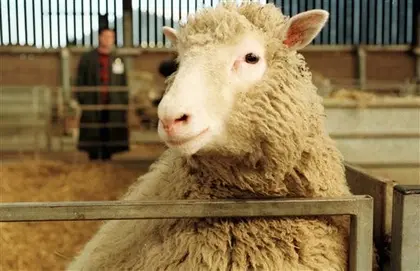Campbell,
who had worked on animal improvement and cloning since 1999, died Oct.
5, university spokesman Tim Utton said. He did not specify the cause,
only saying that Campbell had worked at the university until his death.
Campbell
began researching animal cloning at the Roslin Institute near Edinburgh
in 1991. The experiments led to the birth in 1996 of Dolly the sheep,
the first mammal to be cloned from an adult cell.
The sheep was
named after voluptuous singer Dolly Parton. Researchers at the time said
that the sheep was created from a mammary gland cell, and that Parton
offered an excellent example.
The creation of the sheep captured
the public imagination and instantly became a scientific sensation. The
experiments drew admiration but also anger from some who raised
questions about the ethics of cloning.
Animal rights activists
were outraged, while the Church of England expressed reservations. Dolly
was put down in 2003 after she developed lung disease.
Campbell’s interest in cellular growth dated back to his college days studying microbiology in London.
“At
this time it was known that the majority of cells within an adult
contain an intact genome; however, many scientists were skeptical that
the nuclei of such cells could be reprogrammed to control development.
Stubbornly, I always believed that such technology was possible,” he
wrote in an autobiographical essay in 2008, when he was awarded the Shaw
prize for medicine and life sciences. He received the recognition along
with Ian Wilmut, the lead scientist in the team that created Dolly, and
Nobel-winning scientist Shinya Yamanaka.
After the birth of
Dolly, Campbell oversaw the successful cloning of other animals like
pigs and lambs. In 1999, he joined Nottingham University as professor of
animal development, where he continued research into the cloning
process. He was particularly interested in assisted reproduction in both
animals and humans, and studied ways to develop reproductive
technologies in farm animals to enhance breeding and maintain food
security.
He believed research into medical use of embryonic stem
cells would eventually lead to important breakthroughs despite
opposition from some who found the technique abhorrent.
“There are
groups that believe that life begins at conception and that you should
not do any research involving embryos at all,” he said in a 2001
interview. “But we have also been able to inform people of the potential
benefits, and once they learn about it they are much more likely to be
in favor of it.”
He said stem cells from embryos have the unique
ability to be developed into many different types of human cells,
including blood, muscle and nerve cells.
“Broadly, I would say
they may be a major breakthrough in human medicine that will improve the
quality of life for a large number of the population, particularly
those with age-related disorders,” Campbell said.
Campbell is survived by two daughters, Claire and Lauren.
You can also highlight the text and press Ctrl + Enter







Comments (0)